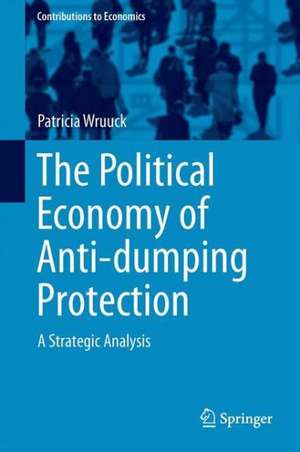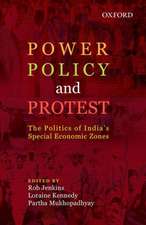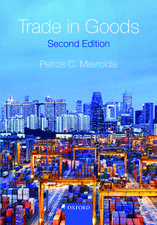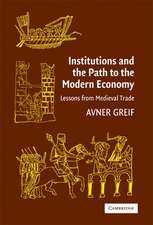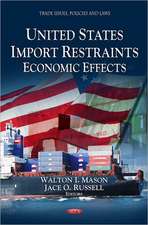The Political Economy of Anti-dumping Protection: A Strategic Analysis: Contributions to Economics
Autor Patricia Wruucken Limba Engleză Hardback – 12 mar 2015
Dr. Klaus Günter Deutsch, Managing Director, Research, Economic and Industrial Policy, German Federation of Industries
This book successfully integrates two research traditions in international politics – the traditional view that looks at domestic factors of anti-dumping policies and the strategic view that conditions the imposition of anti-dumping measures on the likely, retaliatory behavior of the trading partner. The result is an informative and constructive examination of anti-dumping protection and trade wars in the WTO.
Prof. Dr. Thomas Bräuninger, Chair of Political Economy, University of Mannheim, Germany
"The Political Economy of Anti-Dumping Protection - A Strategic Analysis" is a major contribution to the important and growing field international political economy. Starting with the “traditional” comparative institutional analysis, whichfocuses on the implications of democratic and non-democratic regimes for using anti-dumping measures in trade politics, the second part applies a strategic perspective on this type of sanctions uncovering the dynamic interactions between a challenging and challenged countries. For all those interested in understanding the logic of sanctions, the role of institutions, and in how to examine the implications of theoretical models for international political economy this book is a “must read".
Prof. Dr. Thomas König, Chair of Political Science II, University of Mannheim, Germany.
| Toate formatele și edițiile | Preț | Express |
|---|---|---|
| Paperback (1) | 381.43 lei 6-8 săpt. | |
| Springer International Publishing – 6 oct 2016 | 381.43 lei 6-8 săpt. | |
| Hardback (1) | 388.72 lei 6-8 săpt. | |
| Springer International Publishing – 12 mar 2015 | 388.72 lei 6-8 săpt. |
Din seria Contributions to Economics
- 18%
 Preț: 1109.92 lei
Preț: 1109.92 lei - 24%
 Preț: 657.06 lei
Preț: 657.06 lei - 15%
 Preț: 649.06 lei
Preț: 649.06 lei -
 Preț: 283.93 lei
Preț: 283.93 lei - 18%
 Preț: 1027.83 lei
Preț: 1027.83 lei -
 Preț: 90.83 lei
Preț: 90.83 lei - 18%
 Preț: 1001.81 lei
Preț: 1001.81 lei - 17%
 Preț: 361.01 lei
Preț: 361.01 lei -
 Preț: 307.42 lei
Preț: 307.42 lei - 15%
 Preț: 644.95 lei
Preț: 644.95 lei - 15%
 Preț: 638.24 lei
Preț: 638.24 lei -
 Preț: 394.29 lei
Preț: 394.29 lei - 15%
 Preț: 636.80 lei
Preț: 636.80 lei - 15%
 Preț: 637.78 lei
Preț: 637.78 lei - 18%
 Preț: 723.69 lei
Preț: 723.69 lei - 15%
 Preț: 635.47 lei
Preț: 635.47 lei - 15%
 Preț: 634.00 lei
Preț: 634.00 lei -
 Preț: 392.75 lei
Preț: 392.75 lei -
 Preț: 383.33 lei
Preț: 383.33 lei - 15%
 Preț: 637.28 lei
Preț: 637.28 lei - 15%
 Preț: 636.80 lei
Preț: 636.80 lei - 18%
 Preț: 950.96 lei
Preț: 950.96 lei - 15%
 Preț: 634.68 lei
Preț: 634.68 lei -
 Preț: 387.38 lei
Preț: 387.38 lei - 15%
 Preț: 647.27 lei
Preț: 647.27 lei - 15%
 Preț: 636.63 lei
Preț: 636.63 lei - 15%
 Preț: 639.73 lei
Preț: 639.73 lei -
 Preț: 385.62 lei
Preț: 385.62 lei - 15%
 Preț: 641.85 lei
Preț: 641.85 lei - 20%
 Preț: 649.60 lei
Preț: 649.60 lei - 15%
 Preț: 641.71 lei
Preț: 641.71 lei -
 Preț: 387.96 lei
Preț: 387.96 lei - 15%
 Preț: 645.47 lei
Preț: 645.47 lei -
 Preț: 385.08 lei
Preț: 385.08 lei - 15%
 Preț: 646.62 lei
Preț: 646.62 lei -
 Preț: 383.33 lei
Preț: 383.33 lei - 15%
 Preț: 638.43 lei
Preț: 638.43 lei -
 Preț: 381.21 lei
Preț: 381.21 lei - 15%
 Preț: 642.51 lei
Preț: 642.51 lei - 15%
 Preț: 637.78 lei
Preț: 637.78 lei - 15%
 Preț: 641.71 lei
Preț: 641.71 lei -
 Preț: 384.70 lei
Preț: 384.70 lei -
 Preț: 379.86 lei
Preț: 379.86 lei -
 Preț: 378.34 lei
Preț: 378.34 lei -
 Preț: 384.70 lei
Preț: 384.70 lei -
 Preț: 388.52 lei
Preț: 388.52 lei - 15%
 Preț: 641.71 lei
Preț: 641.71 lei -
 Preț: 381.00 lei
Preț: 381.00 lei - 15%
 Preț: 644.95 lei
Preț: 644.95 lei -
 Preț: 386.00 lei
Preț: 386.00 lei
Preț: 388.72 lei
Nou
Puncte Express: 583
Preț estimativ în valută:
74.39€ • 77.76$ • 62.86£
74.39€ • 77.76$ • 62.86£
Carte tipărită la comandă
Livrare economică 06-20 martie
Preluare comenzi: 021 569.72.76
Specificații
ISBN-13: 9783319112237
ISBN-10: 3319112236
Pagini: 180
Ilustrații: XI, 167 p. 16 illus.
Dimensiuni: 155 x 235 x 17 mm
Greutate: 0.43 kg
Ediția:2015
Editura: Springer International Publishing
Colecția Springer
Seria Contributions to Economics
Locul publicării:Cham, Switzerland
ISBN-10: 3319112236
Pagini: 180
Ilustrații: XI, 167 p. 16 illus.
Dimensiuni: 155 x 235 x 17 mm
Greutate: 0.43 kg
Ediția:2015
Editura: Springer International Publishing
Colecția Springer
Seria Contributions to Economics
Locul publicării:Cham, Switzerland
Public țintă
ResearchCuprins
Chapter 1. Introduction.- Chapter 2. Institutions and Trade Policy – A Review.- Chapter 3. Winning Coalition Size and the Use of Anti-dumping.- Chapter 4. A Strategic Analysis of Anti-dumping.- Chapter 5. Concluding Remarks.- Appendix.
Notă biografică
Patricia Wruuck works as an Economist at Deutsche Bank Research. She previously held a research position at the University of Mannheim’s chair of political sciences (international politics), where she focused on economic policy, trade and political economy issues.
Textul de pe ultima copertă
This book deals with anti-dumping measures (AD) and investigates two questions: First, what country characteristics affect AD use and notably, do domestic political institutions have an effect? Second, (how) is the decision to impose a new AD measure affected by anticipation of trading partners’ potential retaliation? This book applies a strategic perspective to AD to address these questions, presenting a game-theoretic model together with an empirical test. The approach sheds light on the dynamics of interaction between trading partners and allows to capture selection processes which underpin the trade restrictions that can actually be observed.
The book provides a fresh look on when and how trading powers apply antidumping measures, how this is shaped by strategic interaction and whether institutions do make a difference to the outcome. In a period in which the international trading system has to cope with numerous stresses such as an increased resort to administered protection largely by big emerging economies, this is a timely and important contribution.
Dr. Klaus Günter Deutsch, Managing Director, Research, Economic and Industrial Policy, German Federation of Industries
This book successfully integrates two research traditions in international politics – the traditional view that looks at domestic factors of anti-dumping policies and the strategic view that conditions the imposition of anti-dumping measures on the likely, retaliatory behavior of the trading partner. The result is an informative and constructive examination of anti-dumping protection and trade wars in the WTO.
Prof. Dr. Thomas Bräuninger, Chair of Political Economy, University of Mannheim, Germany
"The Political Economy of Anti-Dumping Protection - A Strategic Analysis" is a major contribution to the important and growing field international political economy. Starting with the “traditional” comparativeinstitutional analysis, which focuses on the implications of democratic and non-democratic regimes for using anti-dumping measures in trade politics, the second part applies a strategic perspective on this type of sanctions uncovering the dynamic interactions between a challenging and challenged countries. For all those interested in understanding the logic of sanctions, the role of institutions, and in how to examine the implications of theoretical models for international political economy this book is a “must read".
Prof. Dr. Thomas König, Chair of Political Science II, University of Mannheim, Germany
The book provides a fresh look on when and how trading powers apply antidumping measures, how this is shaped by strategic interaction and whether institutions do make a difference to the outcome. In a period in which the international trading system has to cope with numerous stresses such as an increased resort to administered protection largely by big emerging economies, this is a timely and important contribution.
Dr. Klaus Günter Deutsch, Managing Director, Research, Economic and Industrial Policy, German Federation of Industries
This book successfully integrates two research traditions in international politics – the traditional view that looks at domestic factors of anti-dumping policies and the strategic view that conditions the imposition of anti-dumping measures on the likely, retaliatory behavior of the trading partner. The result is an informative and constructive examination of anti-dumping protection and trade wars in the WTO.
Prof. Dr. Thomas Bräuninger, Chair of Political Economy, University of Mannheim, Germany
"The Political Economy of Anti-Dumping Protection - A Strategic Analysis" is a major contribution to the important and growing field international political economy. Starting with the “traditional” comparativeinstitutional analysis, which focuses on the implications of democratic and non-democratic regimes for using anti-dumping measures in trade politics, the second part applies a strategic perspective on this type of sanctions uncovering the dynamic interactions between a challenging and challenged countries. For all those interested in understanding the logic of sanctions, the role of institutions, and in how to examine the implications of theoretical models for international political economy this book is a “must read".
Prof. Dr. Thomas König, Chair of Political Science II, University of Mannheim, Germany
Caracteristici
Includes supplementary material: sn.pub/extras
